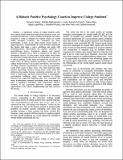| dc.contributor.author | Jeong, S | |
| dc.contributor.author | Alghowinem, S | |
| dc.contributor.author | Aymerich-Franch, L | |
| dc.contributor.author | Arias, K | |
| dc.contributor.author | Lapedriza, A | |
| dc.contributor.author | Picard, Rosalind W. | |
| dc.contributor.author | Park, HW | |
| dc.contributor.author | Breazeal, C | |
| dc.date.accessioned | 2021-11-02T17:31:41Z | |
| dc.date.available | 2021-11-02T17:31:41Z | |
| dc.date.issued | 2020 | |
| dc.identifier.uri | https://hdl.handle.net/1721.1/137133 | |
| dc.description.abstract | © 2020 IEEE. A significant number of college students suffer from mental health issues that impact their physical, social, and occupational outcomes. Various scalable technologies have been proposed in order to mitigate the negative impact of mental health disorders. However, the evaluation for these technologies, if done at all, often reports mixed results on improving users' mental health. We need to better understand the factors that align a user's attributes and needs with technology-based interventions for positive outcomes. In psychotherapy theory, therapeutic alliance and rapport between a therapist and a client is regarded as the basis for therapeutic success. In prior works, social robots have shown the potential to build rapport and a working alliance with users in various settings. In this work, we explore the use of a social robot coach to deliver positive psychology interventions to college students living in on-campus dormitories. We recruited 35 college students to participate in our study and deployed a social robot coach in their room. The robot delivered daily positive psychology sessions among other useful skills like delivering the weather forecast, scheduling reminders, etc. We found a statistically significant improvement in participants' psychological wellbeing, mood, and readiness to change behavior for improved wellbeing after they completed the study. Furthermore, students' personality traits were found to have a significant association with intervention efficacy. Analysis of the post-study interview revealed students' appreciation of the robot's companionship and their concerns for privacy. | en_US |
| dc.language.iso | en | |
| dc.publisher | IEEE | en_US |
| dc.relation.isversionof | 10.1109/RO-MAN47096.2020.9223588 | en_US |
| dc.rights | Creative Commons Attribution-Noncommercial-Share Alike | en_US |
| dc.rights.uri | http://creativecommons.org/licenses/by-nc-sa/4.0/ | en_US |
| dc.source | arXiv | en_US |
| dc.title | A Robotic Positive Psychology Coach to Improve College Students' Wellbeing | en_US |
| dc.type | Article | en_US |
| dc.identifier.citation | Jeong, S, Alghowinem, S, Aymerich-Franch, L, Arias, K, Lapedriza, A et al. 2020. "A Robotic Positive Psychology Coach to Improve College Students' Wellbeing." 29th IEEE International Conference on Robot and Human Interactive Communication, RO-MAN 2020. | |
| dc.contributor.department | Massachusetts Institute of Technology. Media Laboratory | |
| dc.relation.journal | 29th IEEE International Conference on Robot and Human Interactive Communication, RO-MAN 2020 | en_US |
| dc.eprint.version | Author's final manuscript | en_US |
| dc.type.uri | http://purl.org/eprint/type/ConferencePaper | en_US |
| eprint.status | http://purl.org/eprint/status/NonPeerReviewed | en_US |
| dc.date.updated | 2021-06-24T16:15:16Z | |
| dspace.orderedauthors | Jeong, S; Alghowinem, S; Aymerich-Franch, L; Arias, K; Lapedriza, A; Picard, R; Park, HW; Breazeal, C | en_US |
| dspace.date.submission | 2021-06-24T16:15:17Z | |
| mit.license | OPEN_ACCESS_POLICY | |
| mit.metadata.status | Authority Work and Publication Information Needed | en_US |
